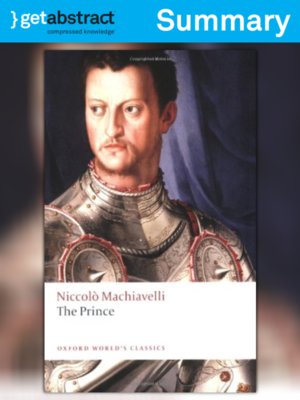
Sign up to save your library
With an OverDrive account, you can save your favorite libraries for at-a-glance information about availability. Find out more about OverDrive accounts.
Find this title in Libby, the library reading app by OverDrive.



Search for a digital library with this title
Title found at these libraries:
| Library Name | Distance |
|---|---|
| Loading... |
getAbstract Summary: Get the key points from this book in less than 10 minutes.
The end justifies the means. This simple, pragmatic maxim underpins Niccolò Machiavelli's classic work, The Prince. Written in 1513, when Machiavelli was a Florentine registry official, this handbook of political power provoked controversy like no other. Its central theme is how Renaissance rulers should act if they want to prevail. According to the author, a strong state requires a leader who is able to defend his power at all costs. Machiavelli maintains that a ruler may deceive, trick, oppress and even murder his opponents, as long as his misdeeds serve the state's stability. Without question, this short treatise offers enough material to demonize its author. However, Machiavelli does not champion unlimited ruthlessness and violence. Nor does he justify any objectives that seem to warrant violence. However, he also does not try to align his work to Christian morals as he examines the practice of statecraft and leadership. The term "Machiavellian" emerged in the 16th century to describe a devious, cruel tyrant, who uses any means to achieve his goals. When 20th century dictators praised Machiavelli's masterpiece, it came into disrepute, but in contemporary thought, its literary foresight makes it a classic. Modern readers will be able to understand the book's significance thanks to the accessible translation and annotations by Peter Bondanella. To put the treatise in context, Maurizio Viroli explains in his introduction, "For Machiavelli, the old way of building and preserving a regime...had to be abandoned in order to embrace a new conception...based on the principle that no state is a true dominion unless it is sustained by an army composed of citizens or subjects." getAbstract recommends The Prince to literature and history buffs, be they subjects or citizens, and to strategists and political scientists as a core work in their field.
Book Publisher:
Oxford UP







